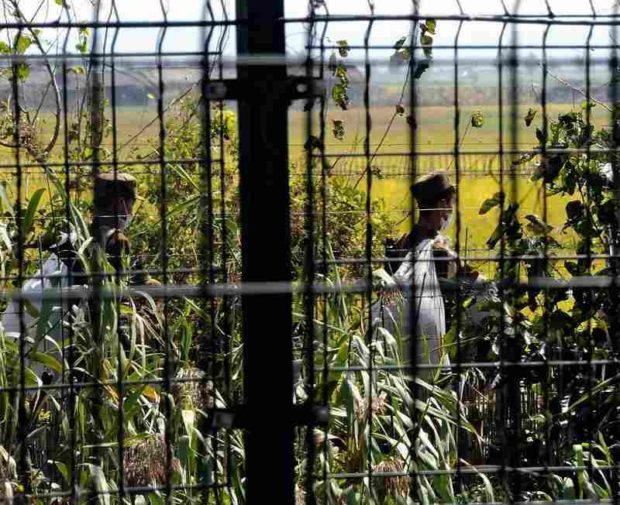
Mask-wearing soldiers are seen on the North Korean side of the border in Dandong, Liaoning Province, China, on Sept. 26. The Japan News/Asia News Network
SHENYANG, China — North Korea has been vaccinating against the novel coronavirus since the end of August, The Yomiuri Shimbun has learned from a Chinese-North Korean trade official with close ties to Pyongyang bureaucrats.
Until then, the country reportedly believed only U.S.-made vaccines were trustworthy and thus refused Chinese vaccines allocated through the COVAX program, an international framework to facilitate access to COVID-19 tests and vaccines.
However, this policy changed in spring, following a renewed spread of infections. Pyongyang is currently preparing for another wave of COVID-19, in addition to the normalization of trade and the resumption of travel.
Vaccinations are now being administered in Pyongyang and the country’s border region, including Sinuiju, used as a trading hub with China, and Nampo, a port city that deals with international cargo.
Chinese and Russian vaccines are planned to be administered to the entire North Korean population by the end of January 2023, the source said.
In addition to the delivery by sea of Chinese vaccines in August, a large quantity of PCR test kits and Chinese vaccines were transported to the North by rail on Sept. 26, the first time for the line to be used in five months, the official said.
At the South Korean National Assembly on Wednesday, Seoul’s National Intelligence Service (NIS) said Pyongyang was “conducting large-scale vaccinations” in its border region with China. On Aug. 10, North Korean leader Kim Jong Un declared that his country had won the battle against COVID-19, but the NIS said this was “difficult to believe.”
North Korea announced its first COVID outbreak on May 12. Despite not vaccinating people against the disease, the country declared in August that the outbreak was over. Nonetheless, Kim Jong Un said in August that he would “commit to carrying out vaccinations,” while stressing that “we must secure necessary medical supplies even if we have to import them,” during an administrative policy speech early September, according to the Korean Central News Agency.
North Korea does not have a “cold chain” — a logistic network to transport and manage vaccines at very low temperatures — so it is thought that the country decided to import vaccines made in China and Russia that can be stored in ordinary refrigerators between 2 C and 8 C.
One Chinese-North Korean source explained that “China has, to some extent, been successful in its countermeasures against the pandemic, influencing [North Korea’s] decision to adopt vaccines”
RELATED STORIES
Masks return in North Korea in renewed fight against COVID-19
North Korea declares victory over COVID-19, reveals Kim suffered fever